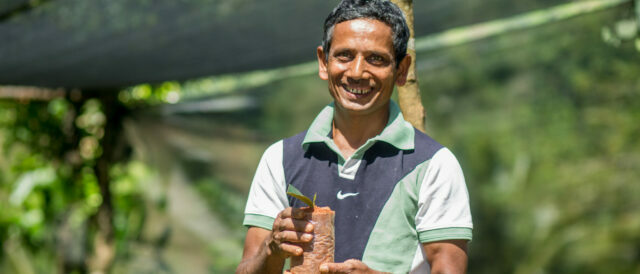Women, mothers, workers. We often forget that in developing countries they represent almost half of the workforce within the agricultural sector. Bananas, tea and cocoa are just some of the main product areas they work in. Yet women own less land and livestock compared to men, and have greater difficulty obtaining credit to support their activities. The path to emancipation in farming organizations, at least where the fairer sex is concerned, is far from smooth and is strewn with numerous obstacles.
The achievements made day after day, thanks to the courage of thousands of these great women, should not be seen just as individual accomplishments, but should be seen (and even encouraged) as part of the wider context to which they belong. This is the subject of the “Equal Harvest” study, published by the Fairtrade Foundation on March 8 to mark International Women’s Day. The Fairtrade Foundation is a charity organization operating in Britain and is part of the international Fairtrade network.
Overcoming cultural barriers that discriminate
Within the international certifications of the Fairtrade network, women still represent only 22% of the workforce of the 1,210 farming organizations in 76 countries in Asia, Africa and Latin America.
There are many reasons for this. From the study it is clear that the main obstacles preventing women from playing an active role within the farming groups are legal, social and cultural constraints. For example, to be a member of these cooperatives an individual is required to own land – which in many cases women do not.
Even for those who manage to join the organizations, the size of ownership is crucial for being given managerial roles, because, again, the representatives are chosen on this basis. Added to this, there are the socio-cultural barriers linked to the community: women are expected to carry out much of the household chores or perform work that goes largely unpaid.
Age, marital status, and lack of education, are other factors that can discourage them from playing a greater role in food production. Yet, just a few incentives would make it easier for women to accept the heavy workloads and face the disapproval of family members.
The advantages of equality
The study describes how by including women in the farming groups, it stimulates productivity, fosters community development, and represents a great opportunity to launch new products or product lines. Interestingly, it is the men themselves who recognize this. As told by the cotton farmer in India who was interviewed for the study, women should be helped to secure positions of leadership “because they are more disciplined and organized and know how to handle situations better, where men tend to compete with each other and exercise their egos”.
Fairtrade, a virtuous example
Fairtrade Standards require that organizations of small producers do not carry out any form of gender discrimination and encourage groups to identify minorities, with particular attention placed on women. The organizations are then encouraged to develop programs for social and economic emancipation.
Furthermore, the Fairtrade premium, that is the profit margin paid to producers to start social emancipation projects, is invested in projects that also benefit women, such as providing assistance for children and training courses to diversify income streams.
“Fairtrade means empowerment and development. Working men and women are transforming situations deeply rooted in their cultures step by step, to build a better future for themselves, their families and their communities”, said Marike De Peña, president of Fairtrade International and director of a Banana cooperative in the Dominican Republic.
It’s a message that brings great hope, launched on a day that recalls the social, economic and political gains obtained by workers since the beginning of the last century that are now more relevant than ever.
English translation by EXPONet – originally published on magazine.expo2015.org [link: http://magazine.expo2015.org/cs/Exponet/en/economy/equal-harvest–when-equality-means-higher-productivity
Cos'è Fairtrade
Siamo un marchio di certificazione e un grande movimento internazionale per la sostenibilità e i diritti umani e ambientali..
Scopri cos'è FairtradeFairtrade Italia
Scopri Fairtrade ItaliaLe storie dei produttori
Il cibo di cui ci nutriamo dipende soprattutto dal lavoro dei piccoli produttori, aziende familiari che coltivano terreni intorno ai 2 ettari.
 Vedi tutte le storie
Vedi tutte le storieProdotti certificati
In tutti i supermercati riconosci i prodotti certificati dal marchio Fairtrade sulla confezione. Alcune insegne hanno in assortimento dei prodotti Fairtrade a loro marchio.
Scopri tutti i prodottiDolci e colazione
Bevande
Frutta
Dispensa
Altro

Supermercati
Ecco le insegne che hanno in assortimento dei prodotti a marchio certificati Fairtrade.
Vedi i supermercati
Ricette
Cosa preparare con il cacao, il riso, le spezie e tutti gli altri prodotti Fairtrade? Abbiamo raccolto centinaia di ricette dolci, salate, vegetariane e senza glutine.
Vedi le ricette



